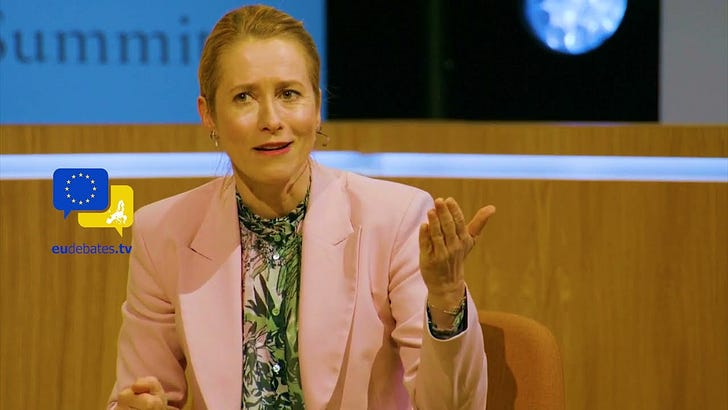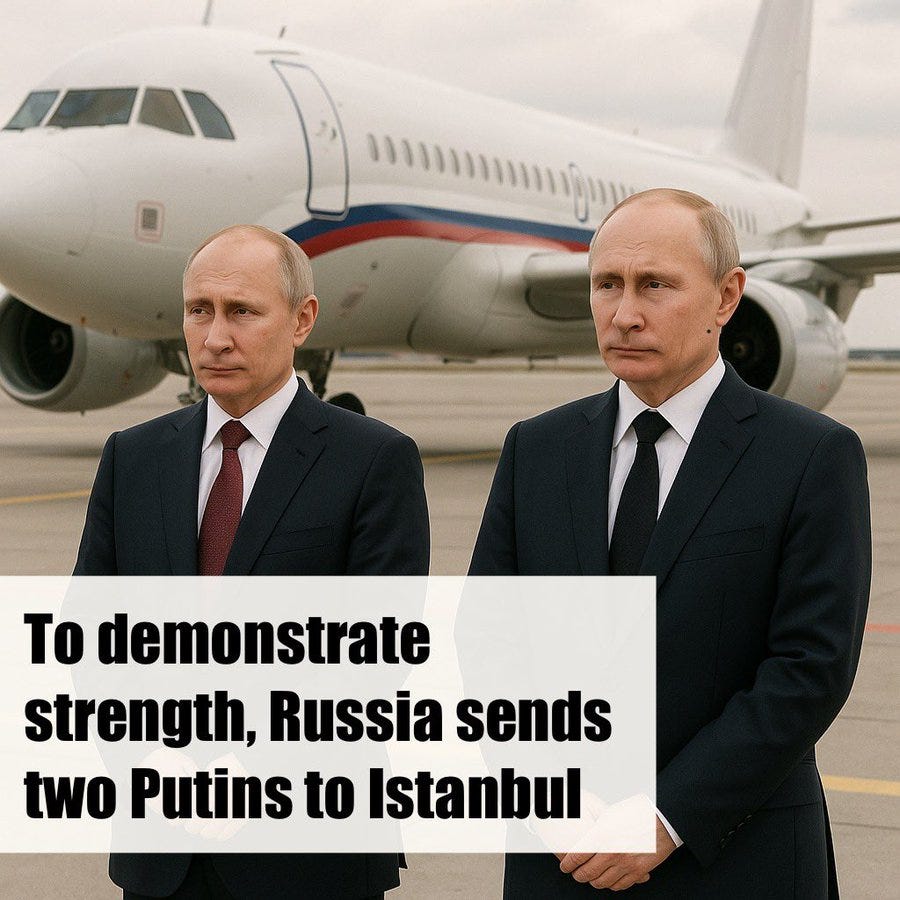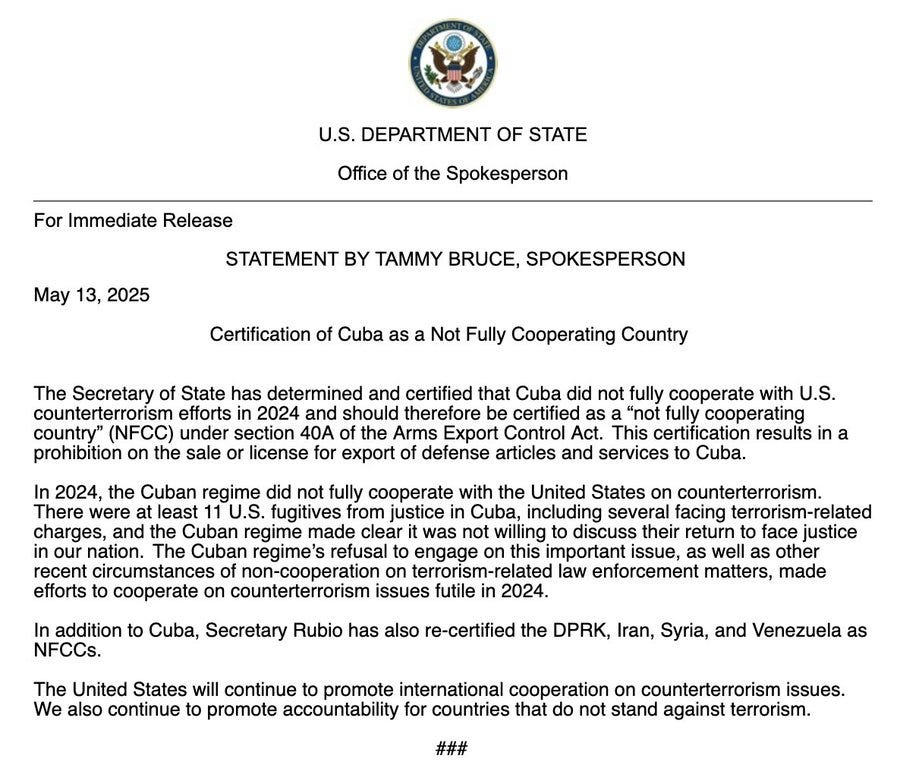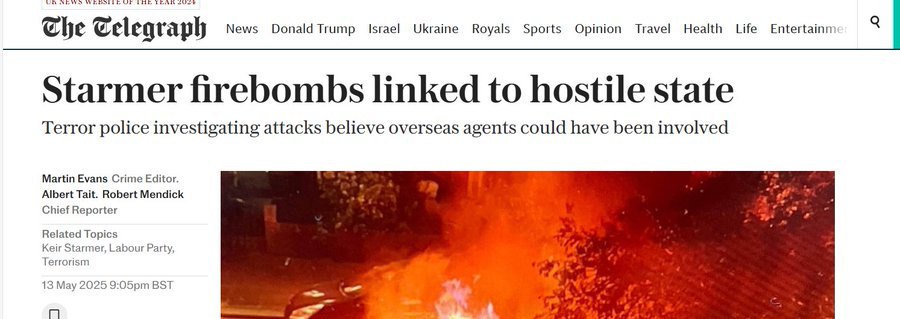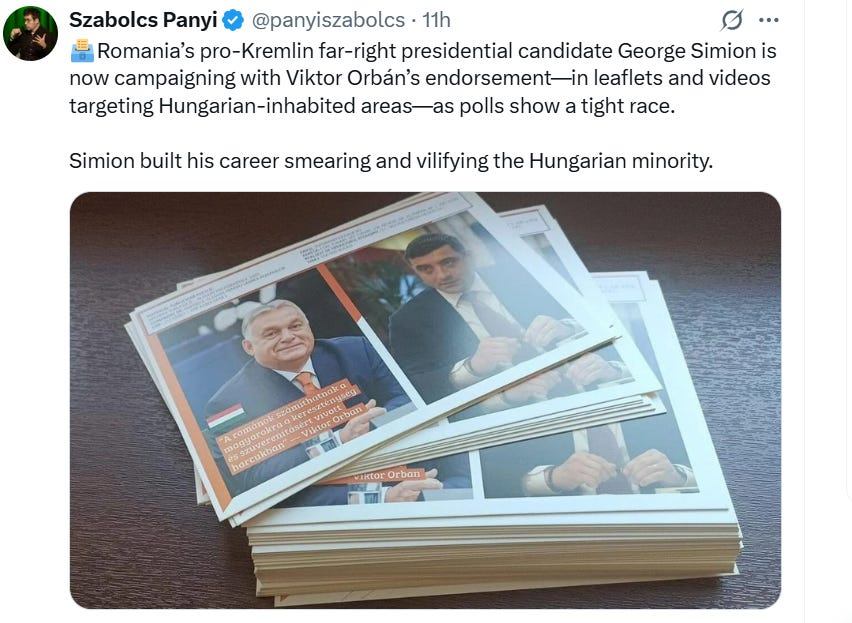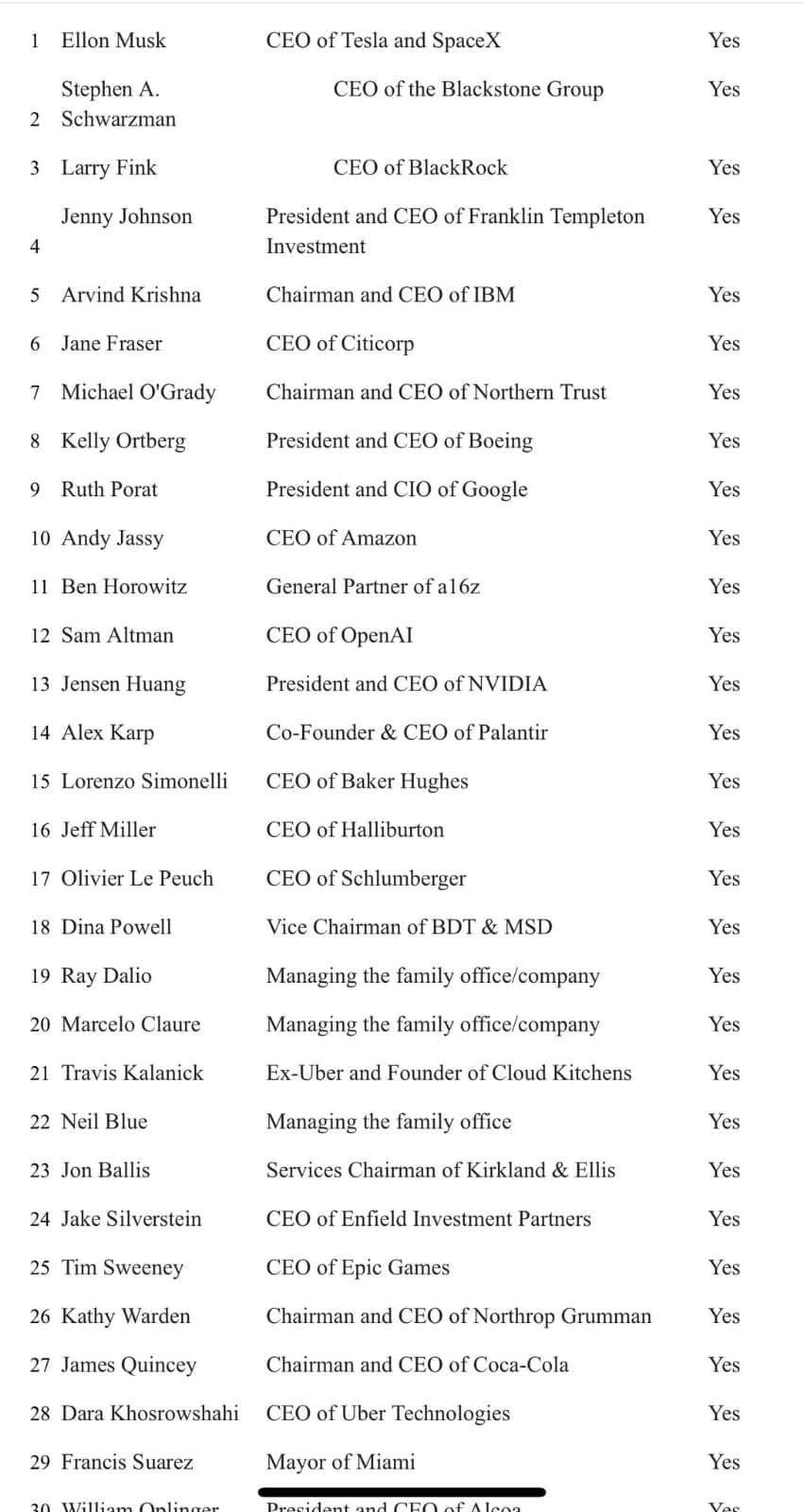May 15: E-Stories
InUkraine CombatSitRep BehindLines RussiaChina RUeco Europe InOtherNews UKDef ISW InstanbulTalks 17thSanctionPack RuShadowFleet TrumpInSA Rosenberg CentBankCA RestPolitics Panyi Kallas Ger France
Catching up…
For specific news about Trump, his regime and its dealings with Russia, I direct you to Olga’s substack. She and Julie Roginsky publish a weekly podcast, “Pax Americana”, which is highly informative.
For a general view of news from various geopolitical threatres, Scott’s EA Worldview is always superb.
Let’s get going…
Stories we’re following…
In the early hours of May 14, Russia launched a ballistic missile (Iskander-M/KN-23) from Crimea and 145 drones (Shahed + imitators) from multiple directions. As of 09:00, 80 Shahed drones confirmed downed in the east, north, west, and center of Ukraine. 42 imitators were lost without negative consequences.
2 killed, 9 injured in a Russian missile strike on city of Sumy. The air raid was announced at around 2:30 p.m. local time, while the explosion sounded around 2:50 p.m.
Two people have been injured in a Russian attack on Rivne Oblast on the morning of 14 May. "This morning was alarming for Rivne Oblast. Air defence forces downed four enemy aerial targets over the oblast. Two people have been injured." There were attacks on Odesa on May 13 as well.
Zelensky: "This is Russia’s narrative — that I can’t negotiate with Putin. No one but me can negotiate on Ukraine’s sovereignty, territorial integrity, and our course. According to Ukraine’s Constitution, these are my rights and duties. I represent our state’s interests. I issued a decree to prevent people like Novinsky and Medvedchuk from holding direct talks with Putin. The idea that I need to cancel something is purely Russia’s narrative. I don’t restrict myself.
Trump’s Ukraine envoy Kellogg: The U.S. is in talks about stationing British, French, German, and Polish troops west of the Dnipro as part of efforts to resolve the war in Ukraine. (Mo: I couldn’t resist—photo below.)
CNN: ‘Our Russian Town!’ Content creators paint a rosy picture of life in occupied Mariupol, with support from the Kremlin
Three years after it seized control of Mariupol following a brutal 86-day siege, Russia is using a more subtle power to keep its grip on the Ukrainian port city: social media influencers.
A CNN investigation found that residents of the occupied city, including schoolchildren, are being trained in new media programs and “blogger schools” with ties to the Russian state.
“Just look what Russia is getting up to in Mariupol,” Pavel Karbovsky, a teacher at one of the blogger schools, said in a recent TikTok video highlighting the construction of new apartment buildings. “Wait, they’re building, not demolishing… this is Mariupol, our Russian town!”
Karbovsky is among a growing number of content creators painting a picture of renewal in cities and towns across the four Ukrainian regions illegally annexed by Russia in 2022 – Donetsk, Luhansk, Kherson and Zaporizhzhia. He said he is not operating as a propagandist. Instead, his mission is “to show the truth” about life in Russian-occupied areas, he told CNN in a video interview from Donetsk.
CNN analyzed over a dozen profiles of local influencers promoting Moscow’s Russification project in Mariupol on social media platforms, some of which are openly pro-Russia and blame Ukraine for the pain inflicted on the region, while others appear apolitical. Despite their modest audiences – ranging from 3,000 to 36,000 on TikTok – their reconstruction-focused content can garner hundreds of thousands of views.
Former nuclear power plant employee arrested for allegedly helping Russia's GRU target drone strikes. The suspect quit his job at the Rivne NPP before the full-scale war began. In the spring of 2025, a GRU liaison contacted him and offered cooperation in exchange for money.
Ukraine, US sign additional agreements for minerals deal, Economy Ministry says. The move follows Ukraine's ratification of the minerals agreement, deepening U.S.-Ukraine economic ties and signaling expanded U.S. involvement in Ukraine's long-term recovery.
A recent survey by Kyiv International Institute of Sociology (KIIS) reveals that 74% of Ukrainians trust President Zelensky, with trust rising from 69% in March. Support for holding elections post-ceasefire remains low, with 71% opposing them until the war ends. Regional differences exist, with the East showing slightly lower trust.
Combat Situation
Despite May 9, Russia's assault actions didn't decrease, but they reduced the use of aviation. According to Tactical Group Luhansk spokesperson Dmytro Zaporizhets, the only thing Russia refrained from during the so-called "ceasefire" was tactical aviation and Shahed drone strikes. (Mo: the Russians have reduced sorties due to the lack of pilots.)
The Russians have advanced in the settlements of Malynivka and Bahatyr and near Novosilka in Donetsk Oblast.
On May 11, Ukraine targeted the headquarters of the 40th Separate Guards Marine Brigade in Rylsk. According to reports, Deputy Commander Alexander Danilov is said to have died from injuries sustained during the attack. Danilov, a veteran of Russia's operations in Syria, was involved in the 2022 invasion of Ukraine and was commanding a unit at the time.
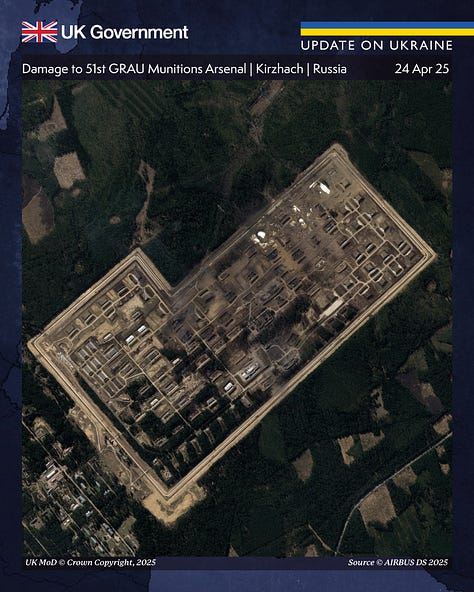
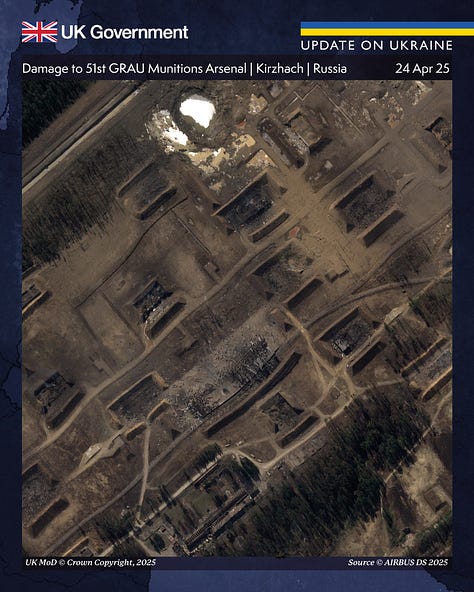
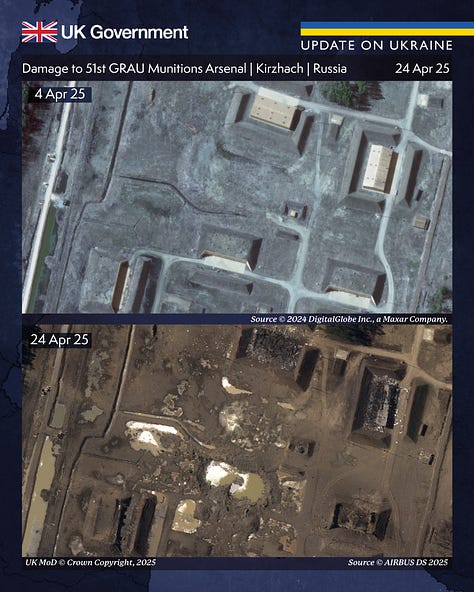
Former gamers from the US, UK, Canada and France are now top FPV operators hitting targets in Russia. Ukraine’s military calls them the best pilots & future of drone warfare.
German shells to be produced in Ukraine. On May 13, "Ukroboronprom" signed a memorandum with defense giant "Rheinmetall" to explore the creation of a joint venture. The parties agreed to establish manufacturing facilities in Ukraine for artillery ammunition. The memorandum was signed in Madrid.
President Macron confirmed that all CAESAR wheeled self-propelled howitzers produced in 2025 will be sent to Ukraine. He also emphasized that the best security guarantee for Ukraine is a strong Ukrainian army.
Behind the Lines
Ansa: The U.S. opposes inviting President Zelensky to the NATO summit in The Hague on June 24, with invitations currently extended only to Asian partners: Japan, South Korea, Australia, and New Zealand. No NATO-Ukraine leaders' council is planned for now, though a ministerial-level meeting might take place.
Ukraine’s Foreign Minister Andrii Sybiiha has arrived in Turkey ahead of anticipated negotiations. He will hold meetings with Ukraine's partners to coordinate diplomatic efforts aimed at achieving a fair peace.
Russian propagandist Solovyev suggests destroying the Reichstag, Élysée Palace, or Tower Bridge to make Europeans "feel a direct and clear threat to themselves".
Kremlin confirms delegation will attend Istanbul peace talks — Lavrov, Ushakov will likely represent Russia. Kremlin spokesperson Dmitry Peskov confirmed that a Russian delegation will be in Istanbul on May 15 for direct peace talks with Ukraine. Foreign Minister Sergey Lavrov and Putin’s foreign policy aide Yuri Ushakov will likely represent Russia.
Le Figaro: France and the US are preparing powerful new sanctions against Russia. French Foreign Minister Jean-Noël Barrot will meet with US Senator Lindsey Graham in Turkey on May 14 to discuss stringent measures aimed at tightening Russia’s economic grip and intensifying pressure on the Kremlin.
German and Swiss authorities have arrested three Ukrainian nationals—on suspicion of planning sabotage attacks on behalf of Russian intelligence services. The men allegedly prepared explosive or incendiary packages intended for dispatch from Germany to Ukraine, targeting freight transport systems.
A scheme involving a bank through which Russia pays for arms deliveries from China has been uncovered by an investigation by a number of outlets in the US, UK and Europe.
International media have discovered that a large-scale criminal network to circumvent anti-Russian sanctions is built around Kyrgyzstan’s "Capital Bank of Central Asia."
With the help of the "Capital Bank of Central Asia," the key bank of the Russian Ministry of Defense — PSB (also known as Promsvyazbank) — carries out payments for weapons that are secretly supplied to the Russian army. The main linking figure in this scheme is the pro-Kremlin oligarch Ilan Shor from Moldova, who is under U.S. sanctions.
According to data from Bloomberg, he owns 51% of the financial company A7. This company is also involved in the sanctions evasion scheme. The remaining 49% of its shares are owned by the military PSB.
Until January 2025, the key position in the criminal scheme was held by Kyrgyzstan’s “Keremet Bank.” The replacement of companies was forced. At the beginning of this year, the United States imposed sanctions on “Keremet Bank” because, as stated in an official OFAC release, since the summer of 2024, “Keremet” officials “coordinated actions with Russian officials and the Russian bank Promsvyazbank,” which is on the U.S. sanctions list. A couple of months later, former “Keremet” officials took key positions in “Capital Bank.” In addition, the “Capital Bank of Central Asia” was designated as the sole bank for conducting cross-border ruble operations to and from Russia.
An ultimatum was issued to Russia: either cease hostilities or face new sanctions.
L’Express: Putin's 13 attacks in France: the secret service's terrifying memo
Computer theft, nuclear threat, power outages, espionage at Polytechnique... Russia is attacking France daily, according to a confidential document from the DGSI and DGSE.
This is a previously unpublished 16-page document that L'Express has obtained. Written by the DGSI , the DGSE , the Directorate of Military Intelligence, the Directorate of Defense Intelligence and Security, and compiled by the General Secretariat for Defense and National Security (SGDSN), this note, intended exclusively for ministers because its content is considered sensitive, is entitled "Russian threats and actions against France." "It's Putin 's black book in France," explains a French intelligence official. Because they are probably barely palpable for the general public, Russian aggressions are not yet really a concern for the French.
"Russia is carrying out offensive actions that could have direct consequences on the lives of the French: attempts to set fire to shopping malls, attacks on undersea telecommunications cables, cyberattacks on satellite terminals, […] cyberattacks aimed at disrupting critical infrastructure, weakening the organization of society, or spying on French entities," it says. "The new thing, since the invasion of Ukraine, is that the Russians are totally uninhibited, they dare anything," comments a military officer.
French engineers reported cases of technical equipment being stolen during international travel. Intelligence officials also accuse Russian officers operating under diplomatic cover of collecting political intelligence and attempting to influence European decision-making. “No meeting is neutral anymore,” the report warns.
Yle: Finland's track gauge is changing: "We are starting from the north, and we have strong support from NATO," says Minister Lulu Ranne
Finland is planning to switch to the European standard gauge. According to Transport Minister Lulu Rante, the government must make a national decision on changing the gauge by July 2027.
Changes to the track gauge would start north of Oulu.
The project is based on improving security of supply and military mobility, as well as developing cross-border connections to Sweden and Norway.
This is not just a Finnish issue, but a joint project of the whole of Europe and NATO, Ranne said at a press conference for the informal meeting of Nordic transport ministers in Helsinki. According to Rante, now is the right time for Finland to join the standard width.
Meanwhile in Russia & China…
Kyiv Insider: Gazprom Neft CEO Alexander Dyukov has confirmed what energy analysts have long suspected: Russia is running out of cheap oil. The country is being forced to tap into so-called “hard-to-recover” reserves—deep, complex, and geologically intractable deposits that require expensive extraction methods, advanced technology, and massive government support.
According to Dyukov, even maintaining current production levels now requires tapping into these complex reserves. At Gazprom Neft alone, more than 60% of oil production already comes from these high-cost sources. By 2030, more than half of new oil production across Russia is expected to come from similar sites.
Putin declared that apologizing to Russia is not enough for Western companies to come back to the Russian market. Please note how giddy he is in this video.
Russia launched a nationwide registry of “controlled individuals” —a system used to track foreign nationals deemed to be living in the country without legal status—in early February 2025.
Being added to the list comes with sweeping restrictions: individuals can lose access to their bank accounts, be barred from leaving their region, driving a car, registering a business, or even getting married — and many risk losing their jobs. But inclusion in the registry isn’t always the result of a legal violation; some people have ended up on the list due to bureaucratic errors. Getting removed can be an uphill battle — and there’s no guarantee of success. BBC News Russian investigated how the system works and what happens to those who find themselves trapped inside it.
Sergey Surovikin, former commander of Russia’s forces in Ukraine who faded from view after Prigozhin rebellion, resurfaces in Algeria.
Migrant children (81%) were not allowed to take Russian language tests to enroll in Russian schools: out of 1,762 applications submitted, only 335 were approved, Rosobrnadzor reported . The agency explained the refusals by an incomplete set of documents, false information, and a lack of vacancies in schools. At the moment, 44 of the 335 children admitted to the test have passed. However, only 27 people (61%) successfully completed the task. The rest were unable to demonstrate the required level of proficiency in Russian.
Agentstvo: Western operations to penetrate Russia’s spiritual communities have reached new depths, according to lawmaker Yana Lantratova, chair of the State Duma’s Public and Religious Associations Committee. At a plenary session on Tuesday, Lantratova described religion as Russia’s “spiritual shield” in the war against Ukraine and warned that European intelligence agencies are using exiled priests to corrupt the nation’s holy order. She singled out Mir Vsem (“Peace to All”), an organization founded by dissident priests that assists other clergymen persecuted for opposing the invasion of Ukraine.
Armenia has abandoned purchases of Russian weapons and has begun to acquire weapons in India and France. Thus, in 2022-2023, Yerevan signed defense contracts with New Delhi for more than $1.5 billion, and with Paris in 2023-2024 - for $250 million. At the same time, Armenia's last defense deal with Russia for $400 million was signed back in 2021 and has not yet been fully implemented. This follows from the report of the Russian International Affairs Council (RIAC) "Russian-Armenian Interaction at the Current Stage", which Vedomosti has become familiar with.
Rubio Certifies Cuba as a Not Fully Cooperating Country under the Arms Export Control Act. "This certification results in a prohibition on the sale or license for export of defense articles and services to Cuba," per DoS Spox.
InformNapalm—Putinjugend: Children for Russian War (2019)
Mo: the militarisation of childhood in Russia is nothing new, and I encourage efforts to bring more information to public awareness of how the Russians have now extended what it does at home to the occupied territories of Ukraine, and their children. InformNapalm’s report is extensive, and merits your time.
After Russia attacked Georgia in 2008 and Ukraine in 2014, militaristic policy has become a norm for Russian society. Moreover, military propaganda is directed not only at the adults — it also targets children. The Kremlin actively influences the yet unshaped child identity and attempts to instill the idea that participation in Russian wars is a sacred duty of every citizen. Propaganda is amplified by the actual military training aimed at children with the goal of their future involvement into military operations. It should be noted that military propaganda efforts engulfs not only Russian children but also those living in the occupied territories as well as children from the countries allied with Russia (Belarus, Serbia). Such militarization constitutes a threat both for the underage children and for the states which are potential targets of Russian aggression — or have already become its victims.
After spying scandal erupts, Orban accuses Ukraine of meddling, cooperating with Hungarian opposition. "Ukraine has initiated a coordinated campaign to vilify Hungary in order to undermine our initiative to hold a poll on (Kyiv's) EU membership," Hungarian Prime Minister Viktor Orban said.
In the EU…
EU ambassadors have just green-lit the 17th sanctions package on Russia, along with additional measures targeting Russia’s human rights abuses, global hybrid interference, and chemical weapons proliferation. Diplomats representing the EU’s 27 member states approved the package at a meeting in Brussels, according to the Polish presidency of the bloc.
The package includes blacklisting 200 oil tankers used to circumvent curbs on Russian oil exports. Companies in countries including Vietnam, Serbia and Turkey accused of helping supply goods to the Russian military are also to face restrictions, reports AFP.
Dozens of Russian officials are to be added to the nearly 2,400 people and entities already facing visa bans and asset freezes. The package also brings sanctions on Russian individuals over cyber-attacks, human rights abuses and sabotage in Europe.
Further to these measures, EU leaders have threatened Russia with “massive sanctions” if it doesn’t agree to a 30-day ceasefire proposal backed by the United States.
FT: EU readies capital controls and tariffs to safeguard Russia sanctions
The European Commission has told national capitals that a large portion of the sanctions, including €200bn in frozen Russian state assets, could be moved on to a different legal basis to circumvent Budapest’s veto, five officials briefed on the ongoing discussions told the Financial Times.
But Hungary, whose Prime Minister Viktor Orbán has repeatedly held up EU sanctions against Russia, has threatened to veto the extension of economic restrictions which lapse at the end of July unless all 27 member states agree to extend them for another six months. The restrictions also include import bans and price caps on sectors like energy.
The workarounds under consideration would only require a majority of EU countries for the sanctions to be extended. Capital controls, which would prevent cash flowing to Russia, and trade measures such as tariffs, are two options that have been mentioned by the commission in recent weeks, the officials said.
EU leaders indicated they will press ahead with further sanctions against Russia – whether or not the US does likewise – if talks in Turkey on Thursday do not produce a ceasefire.
The French president, Emmanuel Macron, said Europe would impose new sanctions if Moscow did not agree to the 30-day ceasefire. The German chancellor, Friedrich Merz, warned Russia on Tuesday that it would face fresh European sanctions if there was no “real progress” this week towards peace in Ukraine, as he urged Putin to meet Zelenskyy. The European Union has already imposed 16 rounds of sanctions on Russia since Putin invaded Ukraine in February 2022.
The EU’s top diplomat, Kaja Kallas, said in Copenhagen on Tuesday: “I think it’s a good move if they sit down … But I don’t think he dares, Putin.” If Putin does not attend, and Zelenskyy does not either, talks are still expected to be held at a lower level between Ukrainian and Russian delegations.
Chancellor Merz at German Parliament: in his first full address, Merz has outlined at the start some of the huge challenges facing Germany, and quickly turned his attention to Ukraine.
“Russia has broken all the rules that have governed our coexistence in Europe since the end of the Second World War, and above all, since overcoming the division of Europe,” he says.
What’s going on in Ukraine, he adds, makes clear that “nothing less than the peaceful order of our entire continent is at stake. In this historic moment of decisiveness, Europe must stand closer together than ever.”
He pledges to continue Germany’s military support of Ukraine, but also to turn Germany’s national military, the Bundeswehr, into the strongest conventional army in Europe by consistently expanding it and investing the necessary resources in it. “We want to be in a position to be able to defend ourselves so that we’re not in a position of having to defend ourselves”.
FT: Macron open to stationing French nuclear weapons in other European nations
French President Emmanuel Macron said he was “ready to open a discussion” with European allies about stationing France’s nuclear weapons on their soil, in an effort to beef up defences against Russia.
“I will define the framework [for talks about French nuclear weapons] in a very official way in the weeks and months to come, but we have already begun things with the provisos I mentioned,” Macron said.
He laid out three conditions for extending France’s nuclear protection to European allies: Paris would not pay for the security of other countries; any deployment of France’s nuclear weapons could not deplete its ability to defend itself; and any decision to use the bombs would remain solely in the hands of the French president.
European countries have been shocked at Trump’s apparent willingness to undermine the transatlantic alliance, while they also fear that Russia will pose a long-term risk both to Ukraine and the rest of continental Europe.
Macron said “the moment we are living through [in Europe] is one of waking up geopolitically”, adding that Europe was first “built for peace” and to link up economies and trade, but “now it is about power”.
The EU Commission president Antonio Costa said he had sought clarity about the meaning of Vučić’s visit to Moscow last week.
“As he [Vučić] explained to me it was a moment to celebrate an event from the past, but in the present Serbia is fully committed with the European accession procedure and Serbia knows that for this we need to have a full alignment in our common foreign and security policy.”
A spokeswoman for EU high representative Kaja Kallas gave a blunter message when asked about the trip on Monday: “You are being judged by the company you keep.”
Peter Dickinson, How much longer will Putin be allowed to continue stalling for time?
The leaders of Britain, France, Germany, and Poland arrived in Kyiv last weekend amid much fanfare to deliver an unprecedented ultimatum to the Kremlin. The time for talk was over, they announced. If Russian President Vladimir Putin did not agree to an unconditional 30-day ceasefire by Monday, he would face tough new sanctions and increased weapons transfers to Ukraine. “All of us here, together with the US, are calling Putin out. If he’s serious about peace, then he has a chance to show it now,” declared British Prime Minister Keir Starmer.
George Simion literally fled from journalists' questions on Tuesday after participating in a debate at the Chamber of Commerce and Industry. A day ago, he staged and filmed without permission a meeting with Digi24 journalists to insult them and say he would not attend their organized debate because he would be "mediatically assassinated." He called the journalists "media assassins."
An investigation by Reporter IS revealed that presidential candidate George Simion was involved in multiple violent actions in Moldova, promotion of extremism. He and his network have been found to be linked to pro-Russian Dodon, and oligarch Plahotniuc, and it is unclear where the money came from.
In other news…
For the sake of brevity and sanity, I will post this one clip of Trump’s speech at the Saudi-U.S. Investment Forum in Riyadh, which he and numerous other American businessmen attended on May 13.
When I heard these words, all I could think of was 9/11: the victims, their families, first responders, and Americans from east to west. Then I thought of the journalist Khashoggi. and his murder.
Trump doesn’t waste any occasion to belittle America and Americans, and the values the US embraces. If Trump has decided that his foreign policy will be transactional and based on economic diplomacy and warfare (tariffs), there is no reason for him to denigrate his own nation and citizens.
Doing so only feeds anti-American sentiment. Critics of the US on social media (provenance unknown) went to town after these comments. He stuck it to the neo-cons (translation: the Jews), the ‘warmongers’, and the ‘military industrial complex’. One proudly stated, “he truly put the knife in the heart of the globalist technocrat cabal”.
The press focused on the presence of Elon Musk in Saudia Arbia on Tuesday, but many other CEOs and chairmen of American companies accompanied Trump. Please note that Trump has frozen the enforcement of the Foreign Corrupt Practices Act.
What the plane ‘gifted’ from the Qataris to Trump signifies is that Trump can pretty much get away with anything.
The Rest is Politics: “From a $400m plane to starvation in Gaza, who will benefit from Trump’s big Gulf visit? Who really brokered the ceasefire between India and Pakistan? Can Zelensky and Ukraine survive on half-promises and secondhand weapons? Join Rory and Alastair as they answer all these questions and more.”
NYT: Wisconsin Judge Indicted on Charges That She Helped Immigrant Evade Agents. Judge Hannah C. Dugan was accused of helping an undocumented immigrant elude federal agents who were waiting to arrest him outside her courtroom.
POLITICO West Wing: Five months ago, the congressional DOGE caucuses were the hottest tickets in town, with many lawmakers in both parties eager to prove they believed the federal government should be reformed.
The Senate and House established the caucuses before Inauguration Day. And soon after, Elon Musk and his former DOGE partner, Vivek Ramaswamy were on Capitol Hill, introducing themselves to lawmakers. The first DOGE caucus meetings in the House were packed.
The caucus has fizzled out: Musk has completed much of his government trimming effort while leaving Congress panicked, and in the dark.
“Congress can enact long-term change, and our 100 committed members and eight specialized working groups are working to codify critical reforms and preparing legislation that will unlock savings for the American people,” Rep. Aaron Bean (R-Fla.) said in a statement.

